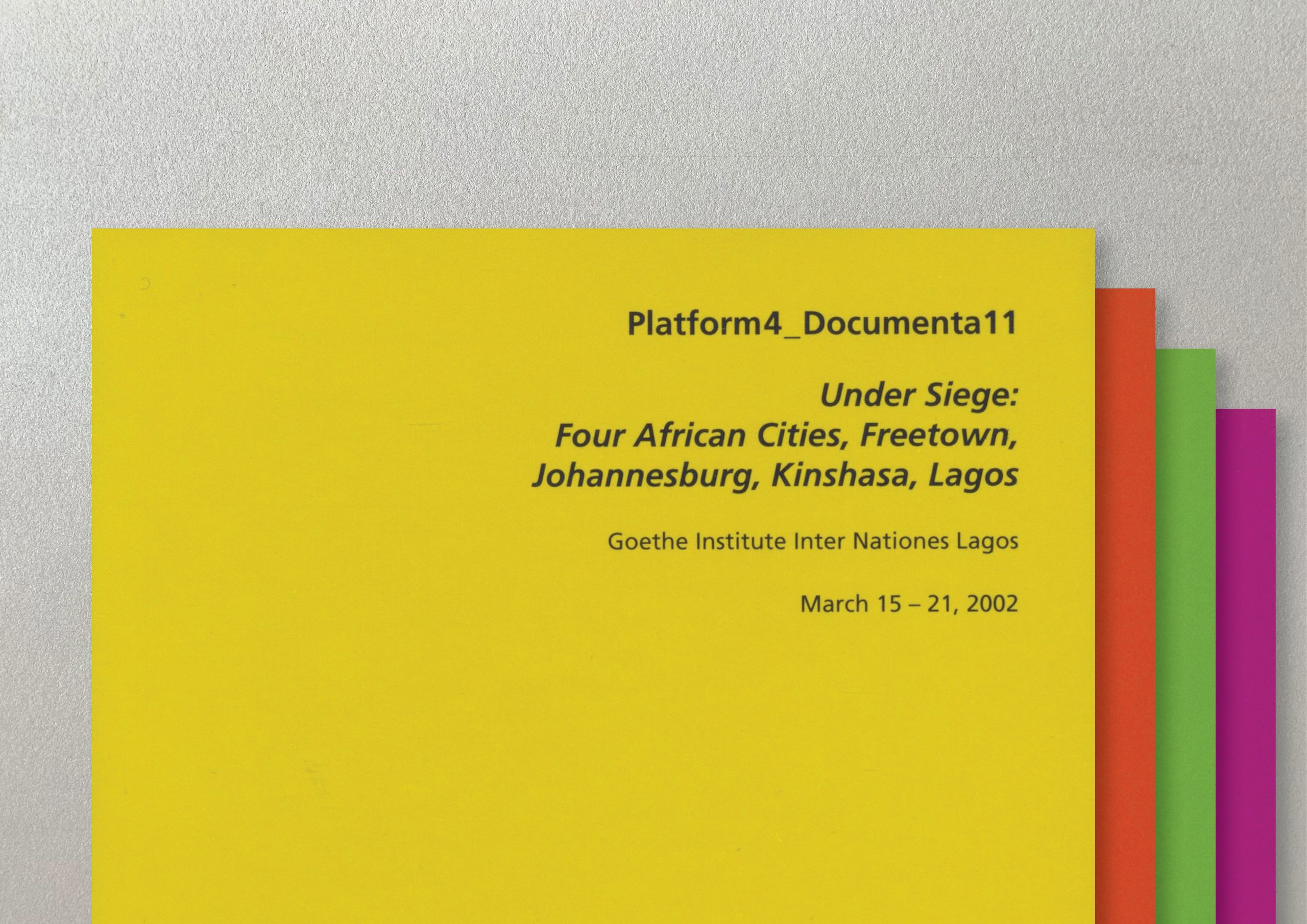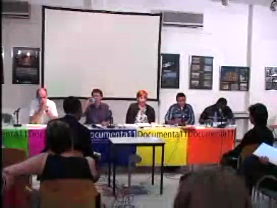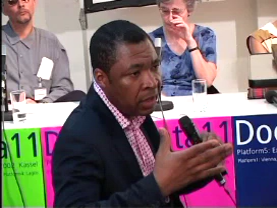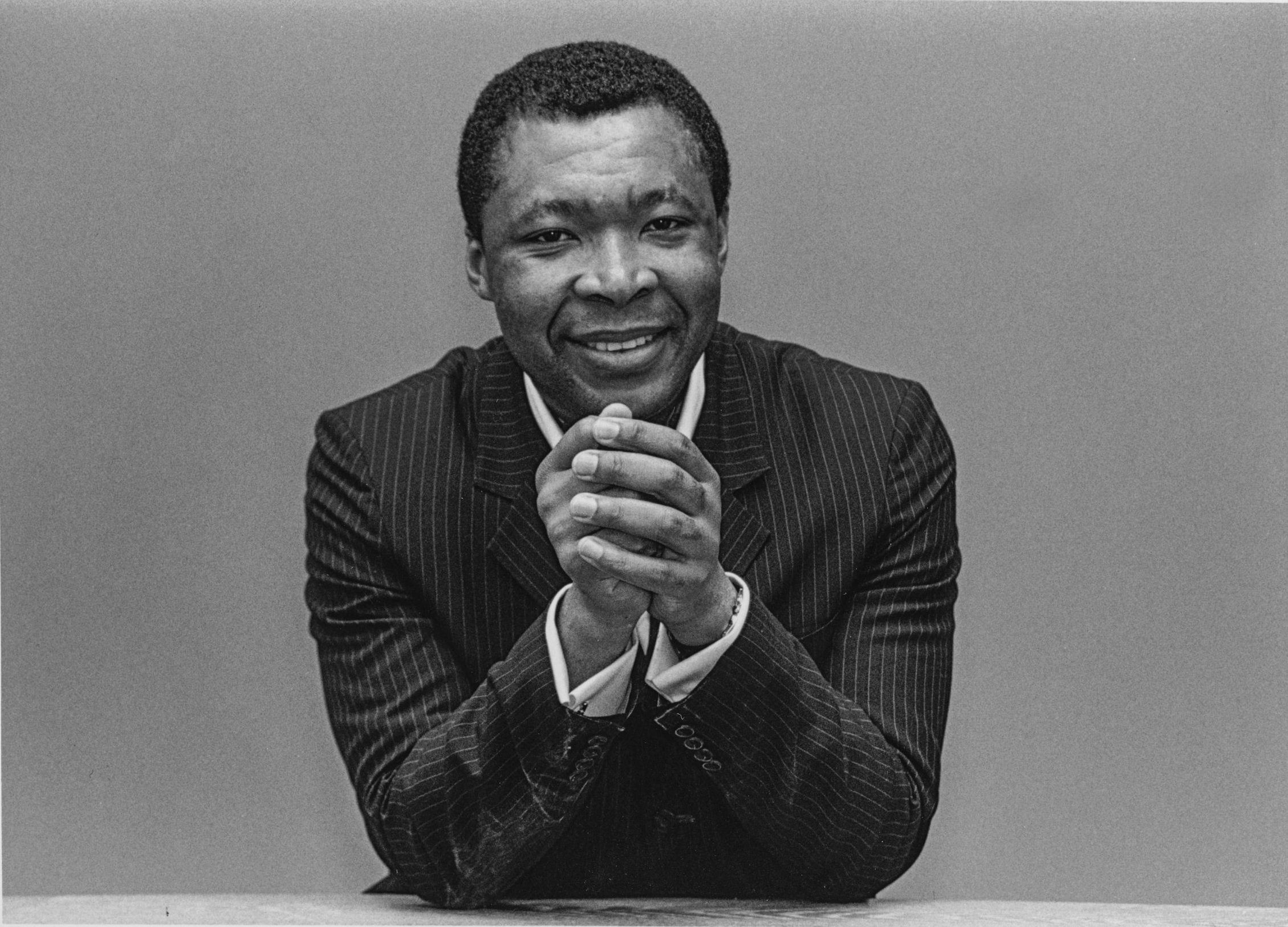Platform4Under Siege 2002
Platform4 Under Siege: Four African Cities, Freetown, Johannesburg, Kinshasa, Lagos
CloseChapters
- Back to Top
- IntroductionIntroduction
- The Micro-Politics of Cities as Location...The Micro-Politics of Cities as Locations of Global Citizenship
- Global Urbanism and the Urban Economies ...Global Urbanism and the Urban Economies of the "Third World"
- Urban Density and Population ExplosionUrban Density and Population Explosion
- The Mottled Screen: Africa's Urban Visio...The Mottled Screen: Africa's Urban Vision
- Exploring the Rift/Shift in the African ...Exploring the Rift/Shift in the African Urban Paradigm
- ConclusionConclusion
Platform4 Under Siege: Four African Cities, Freetown, Johannesburg, Kinshasa, Lagos

© documenta archiv
Introduction
Rather than a generalized and diffuse discussion on cities all over the world, this conference will focus on the specific example of four African cities: Freetown, Johannesburg, Kinshasa, and Lagos. The aim of the conference is to examine the vital place of these cities in the political, social, and cultural economy of the region and to focus on the nature of their social destabilization whether from war, crime, urban decay, AIDS, and population explosion. But more than serving as testament for further deracination of the African continent, the conference will also be concerned with the analyses of how to reinvent the urban imaginaries of these cities as places that still hold great potential for human vitality, creativity, and inventiveness. Our quest will be consolidated around the notion of an ethic of living that places great value on the need to include on the global terrain these areas of neglect. The main thrust of the conference is to produce a discursive site through which to address issues that have affected our perception of cities in the 21st century, using the four African cities mentioned above as a locus for such discussions. The conference will be interdisciplinary and will draw from the ranks of urbanists, architects, sociologists, political scientists, economists, artists, NG0s, criminologists, writers, and intellectuals based both in Africa and abroad for a vigorous encounter and exchange of theories, methodologies, and proposals.
Under Siege: Four African Cities, Freetown, Johannesburg, Kinshasa, Lagos is a conference in a series of public dialogues in six cities in Europe, the Caribbean, Asia, and Africa, being planned as part of the core of Documenta11, which opens in Kassel, Germany on June 8, 2002. The conference also represents the fourth platform within five distinct, thematic areas of Documental 1 which proposes to engage in dialogue and to examine intellectual and historical processes that are implicated in differing strategies of cultural production. By inaugurating this process of exchange between the exhibition based in Kassel and other locations outside
Europe, it is our intention and commitment to embark on an extensive relocation of discourses of globalism and culture to the specificity of sites within which particular questions and issues are inscribed. By operating first on the local level (Vienna, Berlin, New Delhi, St. Lucia, and Lagos) and by allowing these public dialogues and critical exchanges to precede the exhibition more than a year before the official unveiling of the Documental 1 in Kassel, our hope is to dramatize and demonstrate on an immediate level the interdependence of the global paradigm, by revealing how local specificities create new orientations in the global discourse. Additionally, Documenta11s proposition is to expand on the notion of the mutuality which binds artistic praxis, the mega exhibition model, and contemporary art as vehicles of a globalized discourse that requires new interpretative agents. This conference, thus, represents one agent in the complex dynamics of a changing global orientation. Our hope is to bring art and artists into a productive relationship with cultural and intellectual activities that often are seen to be outside the necessity of exhibition practice. In so doing, Documental 1 wishes to also highlight another element in its primary conception, which has to do with the relationship between subjectivity and agency, between artistic practice and intellectual discourse, and between institutions and social spaces, all of which are intimately connected to the ways we conceive of notions such as civil society and citizenship.
The Micro-Politics of Cities as Locations of Global Citizenship
What then constitutes civil society? And what is citizenship? What binds the production of these highly incommensurable denominations to the creative intercourse of cultural and artistic praxis? We would like to believe that, while the notion of nation states remains the conceptual axis around which such questions revolve, it would be necessary to tease out its evolvement through the study of the micropolitics of cities, as primary locations where they are fused.
The question of the city has served as one of the fundamental vectors for the range of experiences we attribute to modern life. The consequence of this has meant that for quite some time agglomerations of people, histories, languages, identities, religions, commodities, cultures, etc. in cities have brought about increasing tensions and demands for a better and more efficient management of the spatial dynamics of our cities. It is from these that a set of initiatives (some based on the notion of sustainable
development, others more obedient to the pragmatic economic demands of global capitalism), that a critical interrogation of urbanism and urban expansion have risen. New theories of this rise in urbanism and the pressure points of expanding populations we have witnessed in the last half century have seen many cities transformed, their social fabric recut to fit the changes that make urban spaces dynamic and volatile at the same time. This tension will continue to be one of the challenging features of metropolitan life in the foreseeable future.

Global Urbanism and the Urban Economies of the "Third World"
Nowhere is this dynamism and volatility more apparent than in the cities of the "third world". The processes of industrialization and rapid urbanization in these economies have contributed to the principal shifts which can be seen not only through the decline of the rural areas, and which are clearly linked and exacerbated through patterns of migration and relocation to cities. On the next level, social and political upheavals have also produced another kind of script within which the narrative of civic, systemic, and institutional destabilization has been written. Migration, relocation, dislocation, destabilization have become the main features of cities. In turn, they have produced new theories and cartographies of space, forms, and iconographies of living and dwelling, strategies of survival, concepts of citizenship, typologies of difference, new demographics of identity and community, and a situational aesthetics which throw into relief dislocutions in the syntax of the cities' urban narrative and iconography. Whether in Asia or Africa, the move to reverse the trends that now threaten the foundation of civil society in these regions have spurred considerations for how new imaginative processes could be used to intervene in the unstable spaces of their cities.
Urban Density and Population Explosion
Induced by economic, political, cultural or religious demands or insufficiencies, "third world" cities have exploded. Whatever might be the case, much of this astounding rise is driven by the overwhelming urban expansion that has not been adequately planned, anticipated or properly managed. In the early 1950s, close to 300 million people, or 16 per cent of the "third world" total population, lived in cities; ten years ago it was already 1.5 billion, or close to 30 per cent. And today, more than one third of the city residents live in some 300 cities comprising more than one million population each.
Within this picture, some assert that Africa is becoming an increasingly urban continent. But to say that urbanization is taking place at an accelerating speed in Africa is an understatement. Between 1950 and 1985, the world population trebled, and in some instances they have quadrupled. Today, in many African cities such as Lagos, Nairobi, Dar es Salaam, Lusaka or Kinshasa, the population has multiplied sevenfold. Today, forty per cent of the African population lives in cities, an explosion that is dangerously approaching a cataclysmic crisis.
Many of these cities are collision points between tradition and modernity, between African development and external pressures; the new site for the reformulation of old and new influences, and the opportunity for the symbolic production of post-colonial identities. They reflect the unstable confluence of divergent paths and agendas (political, social, economic, cultural, infrastructural, institutional, etc.). As a consequence of their colonial legacy, many African cities still remain administrative systems, although disconnected from the city dynamics. Colonialism was indeed a transformative trauma, marking a moment of profound historical discontinuity and rupture. In any case, the syntax of these cities today is not defined by the "modern" grammar inherited from colonialism, nor by the assumption of an organic connection between individual and collective memory, of testimonies and beliefs. In these cities, everything is interpreted and outlined by the apparent chaos of the everyday, where
forms of self-organizing procedures, parallel and informal economies, and the resilience and inventiveness of urban dwellers have relentlessly kept many cities still functional.
The Mottled Screen: Africa's Urban Vision
Because Africa's political scene has been characterized almost exclusively by civil wars, military coups, and disorders of every sort in the media, we fail to see the complexity of a situation that needs reformulation rather than demonization. Thus the instability that forms a large aspect of the media distortion has been associated, promoted, and reinforced with pictures of persistent misery, famine, and insecurity in the selective account of the West. But the issue is not to question whether these simplifications have or have not its basis in reality. Clearly, African urban and social fabrics are under severe strain and the continuous human flow from the countryside to the city has virtually shifted poverty and environmental degradation to urban areas. Some analysts point to this shift as an example of the increasing urbanization of poverty. And they also argue that the high unemployment, housing shortages, inadequate sanitation, lack of planning and of investment in social services are partly the result of the "structural adjustment" measures imposed by the World Bank during the 1980s as part of the debt repayment plans.
As any other urban space around the world, African cities are of course centers for the migration and refuge of increasing numbers of people. As such they are also the meeting place and battleground for two conflicting worlds of power and impotence, wealth and poverty, corruption and hope, center and periphery. But the issue we want to emphasize is that African cities are not only outlined by these troubling bifurcations. Nor do we wish to reproduce only the image of cities riddled with crime, grinding poverty, overcrowded suburbs, and shanty towns, congested living spaces which usually lack essential services and are breeding grounds of disease, ethnic violence, high mortality rate, or the persistent degradation of their environments. These are certainly important issues which need addressing. Yet, our attention is persistently called to focus on the ethical accounting of these cities' dynamism as hosts of great potentials which challenge the often gloomy, doomsday pictures painted by the popular media. As part of the complexity of the issues at play within these urban conditions, there may be a need to highlight the reality of these cities as vibrant spaces that foster "the series of operations in and through which people weave their existence in incoherence, uncertainty, instability and discontinuity", (Mbembe) recapturing the possibility for self-constitution.
Exploring the Rift/Shift in the African Urban Paradigm

© documenta archiv / Video: documenta und Museum Fridericianum Veranstaltungs-GmbH
By more than a few accounts, the African city is the site for the challenge to the political and at the same time the location for negotiations and agreements where new organizations and services, freedoms and autonomous spaces are emerging and developing. This emergence and developments simultaneously propose a modernizing cultural revision and a rearrangement of many of the essential elements of familial identification and authority. Out of these transformations, many of which are improvisatory, new types of relations and exchanges, development and subsistence, 'forms of solidarity and resistance are produced. On different levels, they reflect the expansion of the so-called informal economy, with its small traders, black markets, recycling, and all the numerous forms of urban survival which emerge as radical restructurings of the organizational forms of economic activity. With unemployment and underemployment rates of 70 per cent the norm for most African cities, the ways in which income is generated require constant provisionality and innovation. And it is in the polymorphous and apparently chaotic logic of the postcolonial city that we may find the signs and new codes of expression of new urban identities in formation.
While there is no question that African cities are remarkably different, the web of histories, styles, cultural productions, aesthetic vocabularies, and identifications that distinguish each urban center are clearly being unraveled by emergent forms of urban street culture that reshuffle and reinvent those webs from city to city. In many of these cities, the proliferation of religious associations is significant; some analysts consider religious expression and organization to be the predominant local initiative in urban Africa. In some cities, within the heterogeneous and multiethnic context, the ethnic and group identification resembles the fluid and shifting choices of the informal economy. And yet in other cities, old institutions and local associations are reassembled to suit the needs of the neighborhood.
Conclusion
What can be gleaned from the foregoing is that there can be no neat histories of urban dwelling in Africa, nor of any other region around the world for that matter. Cities in their present context are modern inventions, and as the new electronic pathways that crisscross the globe circulate and readapt images of the modern city, they also produce a desire for tourism that fuel new contacts and movements within already clogged global travel circuits, unraveling the strict hegemonic tendencies that have always made it difficult to read the narrative of spatial difference. To this end, Freetown, Johannesburg, Kinshasa, and Lagos are good examples of these kinds of unraveling, reformulation and innovation. Under Siege: Four African Cities, Freetown, Johannesburg, Kinshasa, Lagos proposes to examine the roots of these unravelings and social undoings of the four cities. Equally, it will aim to shine a bright critical light on the approaches in these four cities that open up new paths of agency, creative reappropriation of resources, and the new subjectivities they produce. We must take new measures to articulate the reductionism of afro-pessimism,
which often understands these new series of operations primarily as emanations or reactions to the West. We must ask ourselves whether there are modernities outside the reactive "alternatives" to the West; modernities that emerge out of postcolonial histories and global phenomena. But which also engage different kinds of understanding of wealth, subjectivity, and the social sphere so often taken for granted when approaching modernity and globalization.
Contributors of Platform4:
Mohamadou Abdoul, Ibrahim Adullah, Victor A. O. Adetula, Babatunde A. Ahonsi, Antoine Bouillon, Lindsay J. Bremner, Filip De Boeck, Mohammed Gheris, Koku Konu, Rem Koolhaas, Achille Mbembe and Janet Roitman, Thierry Nlandu, Onookome Okome, Carole Rakodi, Maxine Reitzes, AbdouMaliq Simone, Jean Omasombo Tshonda, Mohammed-Bello Yunusa, Alfred B. Zack-Williams and Bahru Zewde.
Documenta11 Brochure
Platform4: Under Siege: Four African Cities, Freetown, Johannesburg, Kinshasa, Lagos in Lagos has been organzied by Documenta11 in collaboration with the Goethe-Institute Inter Nationes, Munich and Lagos, with CODESRIA (Council for the Development of Social Science Research in Africa), Dakar, Senegal, and with generous support of the Ford Foundation, New York.
Concept
Okwui Enwezor
Project Advisor
AbdouMailq Simone
Lagos Coordinator
Chika Okeke
Editing
Barbara Clausen, Markus Müller, Christian Rattemeyer, Christina Werner
Design
atelier groteske
Print date: 03/02
Signature: docA, AA, d11, File 101, fol. 4
